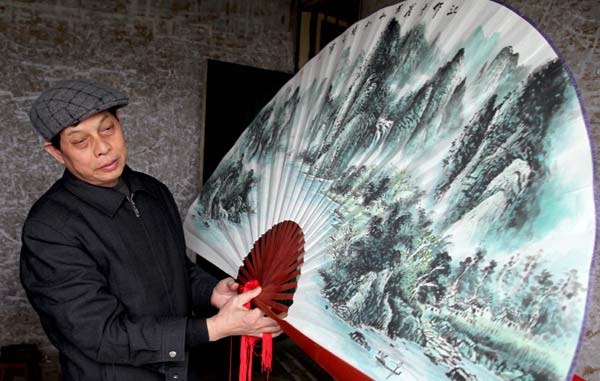Artist of the handmade fan
By Xu Lin in Yangshuo, Guangxi (China Daily) Updated: 2012-05-15 07:28
 |
|
Zhao Qifa, a 63-year-old maker of painted fans, demonstrates one of his creations at his workshop in Yangshuo, the Guangxi Zhuang autonomous region, on March 14.PHOTO BY HUO YAN / CHINA DAILY |
Zhao Qiaofa never imagined traditional fans would bring the winds of change to his life.
The 63-year-old lived as a poor farmer - both in the sense of not earning much and not having a green thumb - until he discovered there was money in handmade folding fans.
"The fan is more of a symbol of Chinese history than something people use to cool down," Zhao said.
"A scholar must wield his folding fan like a warrior wields his sword."
Today, in a different way, they're raising the status of Zhao and his neighbors.
He sells more than 10,000 fans a year for between 40 ($6.35) and 480 yuan apiece. They range in size from 33-120 cm.
"I can make 20 to 30 of the smallest fans or one of the biggest fans in a day," he said.
Since Zhao rediscovered the tradition of making folding fans in 1986, Fuli town in the Guangxi Zhuang autonomous region has become celebrated for the trade.
In 1994 - the industry's heyday - more than 100 of Fuli's households were engaged in the business. Distributors from around the country started to travel to the town in Guilin city to purchase wholesale supplies. Tourists bought fans as souvenirs.
Zhao receives 50 to 180 tourists a day during the spring and autumn tourism peaks. He teaches them how to paint and make fans for 20 yuan a person. Many are foreigners and students from Hong Kong, he said.
Zhao's wife also makes fans. His two sons and daughter also learned the craft and worked for the family business when they were students. Now, his sons earn their living from painting.
Zhao started to learn to paint in 1975 after he met the Guangxi Theater Troupe director who taught Zhao for more than a year.
The director, who was once a painter, was laboring in Zhao's village as punishment during the "cultural revolution" (1966-76), and Zhao took care of him in return for learning the skill.
"I'd always been interested in painting but never thought I could make money doing it," he said.
"Meeting the theater troupe director and learning to paint from him was fate. It changed my life."
Zhao started selling his paintings in Yangshuo in 1984.
Two years later, a customer asked if he could make some folding fans for Japanese tourists.
Zhao spent three days dissecting folding fans to figure out how they were made.
He then made many 1.2-meter fans because tourists like to hang the large fans in their living rooms.
He took a two-hour bus ride downtown to sell his wares to venders at the wholesale price of 80 yuan a piece.
In the following years, he also went to Guangdong province's Shenzhen and Zhuhai cities, and the capital, Guangzhou, to promote his fans. Business boomed. In 1988, he used his 80,000-yuan savings to build a two-story house.
The house has become his workshop, where tourists visit, and he and his wife ply their trade.
Their subject matter includes flowers, birds and bamboo. The most popular is Guilin scenery because the area is celebrated for its karst peaks and rivers. A famous poem says: "East or West, Guilin senary is best."
"I must paint vividly so tourists know it's Guilin the instant they see it," he said.
"It's important to leave some areas blank because Guilin is misty in springtime. The unpainted area depicts the fog surrounding the mountains."
Zhao's 64-year-old wife, Mo Xiaofeng, pastes the painting rendered on the delicate rice paper to three sturdier paper layers.
"The process is complicated," Mo said. "I must stand for the whole day. My hands often hurt."
When the paper dries, Zhao folds and trims it. Then he lines the edges with blue paper.
Next, he inserts bamboo ribs and glues guards to the paper. The final step is to press the fan beneath a brick to tighten it.
"It's more difficult to make smaller fans," Zhao said. "It's a more intricate process."
Sometimes, Zhao paints directly on the mounted paper to save time.
It's tedious but rewarding work.
"I'm not worried about the survival of the craft because my sons can do this," Zhao said.
Huang Feifei contributed to the story.
xulin@chinadaily.com.cn